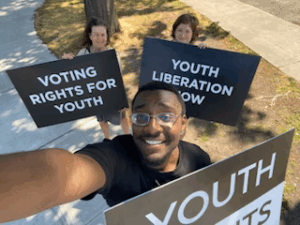Recently, comedian Tracy Morgan has been receiving a lot of attention for a homophobic rant that took place during a live performance in Nashville, Tennessee. During this rant, audience members claim that Morgan stated that if he found out his son was gay he would stab him to death. Since this incident, a variety of lesbian, gay, bisexual, and transgender (LGBT) organizations and individuals have held Morgan’s feet to the fire. Perhaps most notably fellow African-American comedian and lesbian mother of two Wanda Sykes stated quite appropriately that Morgan had “just yelled ‘fire’ in a crowded theater.” Given the recent highly publicized outbreak of LGBT youth suicides and the continuing problem of bias crimes against LGBT people, this is indeed an appropriate appraisal of Morgan’s words. (Of course, LGBT youth suicide and self-harm and bias crimes against LGBT people have long been a problem even if the media attention has only recently reached such a crescendo that those outside our community can reasonably be expected to be aware of it.)
There is much to unpack in Morgan’s hate-filled rant. The notion that LGBT individuals are so diseased and bring such shame on their families that they deserve to be killed is a common trope underlying much violence against LGBT people by their own family members. While this is a problem in American society, it is a much more serious problem in many non-Western cultures in which notions of family honor are intimately bound up with notions of family members’ duty to perform gender and sexuality in socially sanctioned ways and where so-called “honor killings” are a socially acceptable way to deal with those who do not do so. The idea that LGBT identity is unnatural, immoral, and shameful has its roots in many religious, cultural, and social phenomena and addressing them all is well beyond the scope of this post. (That said, for a look at how negative cultural attitudes towards male homosexuality developed in the Western world, I cannot recommend Byrne Fone’s “Homopohbia: A History” highly enough.) Suffice it to note here that this savagery is a common trope in contemporary Western culture, that it is even more common in other societies, and that its deeply harmful consequences for all LGBT people run the gamut from strained family and community relations to the denial of legal rights, with some paying the ultimate price for the bigotry of others with their lives and physical safety.
Another interesting and important component of Morgan’s rant that has not received much sustained media attention is the notion of children as family property whose behavior reflects directly on their parents. Parents are then justified to punish their children in order to bring the children into line with their own self-image. This idea is much more common in many non-Western cultures than it is in the contemporary West (“honor killings” and the ostracism of family members who convert to a different faith or marry outside of their ethnic group or religion are tragically common examples of this in much of Africa, Asia, and the Middle East). However, this concept is by no means solely restricted to those in other societies. Tracy Morgan’s rant highlights only one of the most extreme manifestations of this attitude in our own. In fact, I would argue that the media’s focus on simply the homophobic content of Morgan’s rant reveals how deeply the concept of familial ownership of children is rooted in our society that it is barely commented upon. Oftentimes, those issues we do not address reveal as much about our culture as those we speak loudly about.
When parents express too much investment in their childrens’ choice of occupation, education, dress, religion, political views, friends, or romantic partners I immediately grow concerned. Obviously anyone that cares about another human being will have some concern about the choices she makes in her life. No decent person wishes their child to marry an abusive spouse or to spend too much time with friends that encourage them to engage in criminal activity or consume copious amounts of drugs. Those who have lived longer and seen more of the world may have helpful guidance to give to those younger than them regarding career, education, and relationships. But the authoritarian impulse to mold one’s offspring in the parent’s ideal image is a deeply disturbing one, perhaps publicly highlighted most recently in the barbaric rantings of Amy Chua (who controversially roots her own disgusting behavior in her Chinese heritage). When we hear of families that disown their children for being LGBT, for not fulfilling traditional gender roles, or for marrying outside their race or ethnic group we are inclined to chalk this up to heterosexism, sexism, and racism, respectively. This is true but we should also chalk it up to the much less contested notion that children are parental property. It is also important to note that LGBT and other youth that cannot or will not conform to the social expectations the adults in their families have for them are at an especially high risk of winding up oppressed, homeless, abused, or even killed. (Even though these societal attitudes oppress all young people to varying degrees, some youth are at a disproportionately higher risk than others and many of them are LGBT.) While we often pay attention to the most extreme examples of this phenomenon (such as Chua’s or Morgan’s rants) we all too often fail to critique the much more widely accepted ideology that sustains these extreme examples.
Perhaps because parents (especially in the upper middle and upper classes) are expected to pour so much energy into their children and to delay so much of their own gratification to raise them, they begin to feel a certain ownership of them. Additionally, much in our culture serves to reinforce the notion that children are family property and should be judged as such. It is hard for any one parent to unilaterally opt out of what is a nearly universal social construct.
So we start by critiquing the concept itself. When we begin to call into question the concept of children as familial property, we begin to make the world safer for parents who do not want to be judged by every decision their children make. And most importantly, we make the world safer for their children.






Love love LOVE this! People care more about the reason Morgan threatened his son with violence than the fact that he threatened violence and felt the right to do so at all!
Thank you, friend! <3